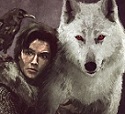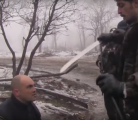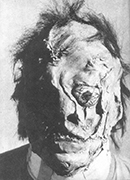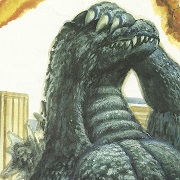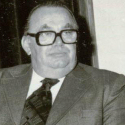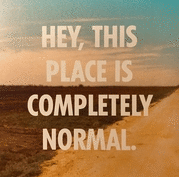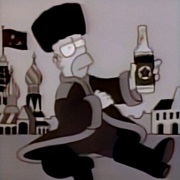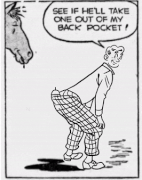|
chernobyl kinsman posted:its good to keep in mind though that hobsbawm was a hardcore marxist who uh defended the Holdomor and his writings about Soviet Russia are sort of...evasive That's one of the many reasons why he's good
|
|
|
|

|
| # ? May 14, 2024 22:04 |
|
Any recommendation on books about Japanese organized crimes, i.e., the Yakuzas? I don't mean books that simply highlight the cruelty (or worse, glorifying them as badasses) of Yakuza, but something that talks in-depth about how organized crimes affect Japanese government, society, etc. I know dudes like Jake Adelstein have been writing about these kinds of things for a while, but his books feel a lot more like investigative reporting rather than something.. academic? Which is something that I'm not really looking for.
|
|
|
|
I've heard that a lot of expats living in Japan consider Jake Adelstein to be self-aggrandizing and often full of poo poo, but I haven't read his work so I can't really comment on it much more than that.
|
|
|
|
Known Lecher posted:I've heard that a lot of expats living in Japan consider Jake Adelstein to be self-aggrandizing and often full of poo poo, but I haven't read his work so I can't really comment on it much more than that. I cannot comment on the 'full-of-poo poo' part though I remember a New Yorker (?) profile on him a while ago anecdotally mentions that he slept with one of the Yakuza boss's girlfriends just to obtain legit information, but I can totally see why he's often regarded as being self-aggrandizing. I think he plunges into the Yakuza underworld mainly because the thrill of it, rather than out of genuine academic-ish interest, which makes his works are rather.. dubious, if you are planning to source it for your paper.
|
|
|
|
chernobyl kinsman posted:its good to keep in mind though that hobsbawm was a hardcore marxist who uh defended the Holdomor and his writings about Soviet Russia are sort of...evasive Interesting piece about Hobsbawn's politics here: http://www.nybooks.com/articles/2003/11/20/the-last-romantic/
|
|
|
|
chernobyl kinsman posted:its good to keep in mind though that hobsbawm was a hardcore marxist who uh defended the Holdomor and his writings about Soviet Russia are sort of...evasive Can't pass up an opportunity to link this excellent article by Tony Judt, which is about Hobsbawm's rather evasive writing on the Soviet Union: http://www.nybooks.com/articles/2003/11/20/the-last-romantic/
|
|
|
|
HighClassSwankyTime posted:Can't pass up an opportunity to link this excellent article by Tony Judt, which is about Hobsbawm's rather evasive writing on the Soviet Union: http://www.nybooks.com/articles/2003/11/20/the-last-romantic/ I think I've found you a friend. Silver2195 posted:Interesting piece about Hobsbawn's politics here: http://www.nybooks.com/articles/2003/11/20/the-last-romantic/
|
|
|
|
here's a good article on hobsbawm's politics, if anyone's interested: http://www.nybooks.com/articles/200...-last-romantic/
|
|
|
|
|
cloudchamber posted:I think I've found you a friend. Memory loss or dementia 
|
|
|
|
Does anybody have any recommendations for books about the Soviet–Afghan War?
|
|
|
|
Goons too pro Stalin to read the second of Stephan Kotkin's volumes? Sad!
|
|
|
|
A human heart posted:That's one of the many reasons why he's good Mass murder? Eh it was the thirties, everybody was doing it!
|
|
|
Despera posted:Goons too pro Stalin to read the second of Stephan Kotkin's volumes? Sad! it's supposed to be great. i would like to get to it at some point this year but it is 1200 pages long and i have poo poo To Do
|
|
|
|
|
chernobyl kinsman posted:it's supposed to be great. i would like to get to it at some point this year but it is 1200 pages long and i have poo poo To Do I'm reading it right now. It's heavy going but incredibly rewarding. Kotkin genuinely goes out of his way to try and explain to try and explain the thinking behind every decision Stalin made. It's strange but, as scathing as Kotkin is about the despot, it dos feel like he has tried to be as fair about his decisions as possible thoughout the book. None of the huge complexities of the issues facing Stalin, especially when it came to handling Nazi Germany and Imperial Japan, are left out, but Kotkin does a great job of balancing how Stalin's perception of these problems were affected by his own ideology and the way Soviet institutions operated.
|
|
|
|
Hungry posted:Does anybody have any recommendations for books about the Soviet–Afghan War? I've enjoyed The Hidden War by Artyom Borovik & The Bear Went Over the Mountain: Soviet Combat Tactics in Afghanistan.
|
|
|
|
Jesus Christ, Forgotten Ally by Rana Mitter is depressing and I only just finished the introduction. Came highly recommended by multiple sources as the best work of modern and unbiased scholarship about China during WW2. This is... not a light hearted subject.
|
|
|
|
cloudchamber posted:I'm reading it right now. It's heavy going but incredibly rewarding. Kotkin genuinely goes out of his way to try and explain to try and explain the thinking behind every decision Stalin made. It's strange but, as scathing as Kotkin is about the despot, it dos feel like he has tried to be as fair about his decisions as possible thoughout the book. None of the huge complexities of the issues facing Stalin, especially when it came to handling Nazi Germany and Imperial Japan, are left out, but Kotkin does a great job of balancing how Stalin's perception of these problems were affected by his own ideology and the way Soviet institutions operated. I'm really enjoying it so far too. The only quibble I have is that, because the book is structured almost as a chronological accounting of each individual decision Stalin made, it can feel a bit disjointed at times. Bouncing between the Spanish Civil War and the beginning of the 1937 purges right now and it feels a tad disorienting.
|
|
|
|
My biggest complaint is ending at june 22nd 2:25 am.
|
|
|
|
HannibalBarca posted:I'm really enjoying it so far too. The only quibble I have is that, because the book is structured almost as a chronological accounting of each individual decision Stalin made, it can feel a bit disjointed at times. Bouncing between the Spanish Civil War and the beginning of the 1937 purges right now and it feels a tad disorienting. I felt that at times too. Like all the stuff about Stalin's spy networks abroad is extremely interesting but it's spread so far apart in the (absolutely huge) text that I had trouble keeping up with who was who.
|
|
|
|
Looking for history of computing books that are focused from the mid-60s up through the mid-80s or so, if such a thing exists. It doesn't have to exclusively be that time period as long as it has plenty of material in that range.
|
|
|
|
Grand Fromage posted:Looking for history of computing books that are focused from the mid-60s up through the mid-80s or so, if such a thing exists. It doesn't have to exclusively be that time period as long as it has plenty of material in that range. Levy, Hackers is another
|
|
|
|
Grand Fromage posted:Looking for history of computing books that are focused from the mid-60s up through the mid-80s or so, if such a thing exists. It doesn't have to exclusively be that time period as long as it has plenty of material in that range. It's more '80s Internet, but I'll pop back in to mention The Cuckoo's Egg again. It's not exactly history of computing, but it's adjacent.
|
|
|
|
Jedi425 posted:It's more '80s Internet, but I'll pop back in to mention The Cuckoo's Egg again. It's not exactly history of computing, but it's adjacent. Early internet is good too. I have this one and haven't read it yet.
|
|
|
|
Any recommendations for books about WW1 in general? I've been on a massive Russian History audiobook kick lately*. That and the recent spate of WW1 memes in the PYF Memes thread (see below) has spurred my interest. *Near as I can remember: 3 Lenin biographies, 2 Stalin biographies, 1 Trotsky biography. Two biographies of Nicholas II, two books on 'the last days of the Romanovs', one book on the Romanov Dynasty overall (1596 - 1917), one book on what happened to the Russian aristocracy after the Revolution, and 2 or 3 books on the Russian Revolution in general. Plus one brief detour to China with a Mao biography.
|
|
|
|
Beef Hardcheese posted:Any recommendations for books about WW1 in general? Ask ten people and you'll probably get ten differnet titles, but I highly recommend A World Undone by GJ Meyer. Someone will invariably tell you to read Barbara Tuchman's Guns of August. It's a fine book, but it shouldn't be anyone's first introduction to WW1.
|
|
|
|
Besides Dadbod's recommendations, you should read Christopher Clark's The Sleepwalkers.
|
|
|
|
Castles of Steel by Robert Massie if you want to learn everything you could ever want to know about the naval aspects of WW1.
|
|
|
|
"The White War" is a great book about the Austro-Italian front. A guy named Prit Buttar has been doing a pretty comprehensive series on the Eastern Front.
|
|
|
|
I enjoyed A Mad Catastrophe by Wawro. Good look at Austria-Hungary in the first year or so of the war, aka "Conrad makes ten thousand unforced errors"
|
|
|
|
Beef Hardcheese posted:Any recommendations for books about WW1 in general? I've been on a massive Russian History audiobook kick lately*. That and the recent spate of WW1 memes in the PYF Memes thread (see below) has spurred my interest. I'd recommend Peter Hart's A Combat History of the Great War, and figure out from there what you're most interested in. If you already know you want to know more about what the Russian Empire was doing, sure, Prit Buttar on the Eastern Front, but pair it with something like Roger Ford's Eden to Armageddon or Edward J Erickson's* Ordered to Die for information about the most successful Russian general of the war, the Caucasus campaign, and their involvement in Persia. *Listen to nothing he says about the Armenian genocide; he has to deny it in order to get access to the Ottoman archives to write about everything else he writes about. Trin Tragula fucked around with this message at 17:52 on Jan 13, 2018 |
|
|
|
FMguru posted:Kidder, The Soul Of A New Machine is the key text for that era Um well sort of. It focuses on the development of one particular minicomputer circa 1980, and the author is not technical nor writing for a technical audience which is annoying at times if you the reader are. Still a classic though.
|
|
|
|
Beef Hardcheese posted:*Near as I can remember: 3 Lenin biographies, 2 Stalin biographies, 1 Trotsky biography. Two biographies of Nicholas II, two books on 'the last days of the Romanovs', one book on the Romanov Dynasty overall (1596 - 1917), one book on what happened to the Russian aristocracy after the Revolution, and 2 or 3 books on the Russian Revolution in general. Plus one brief detour to China with a Mao biography.
|
|
|
|
Thanks for the recommendations; I picked up A World Undone, and will see what grabs my interest through there.Lord Hydronium posted:Any suggested titles out of these? Russian history is one of those things I know very little about. I liked "The Russian Revolution: A New History" by McMeekin as an overall book. It came out just this last year, and I think would be a good 'companion' to "A People's Tragedy" by Figes which came out 20 years ago.* I also liked Robert Service's biographies on Lenin and Stalin, though they're a bit dated (early 2000s). He has a third one on Trotsky that I haven't read. "Former People: The Final Days of the Russian Aristocracy" is the one about the Russian aristocracy, a group that tends to be ignored. None of the Romanov books particularly stuck out to me, but do keep in mind that in 2007 they finally found the missing bodies of Alexei and Anastasia (or one of her sisters). Books written before then may delve into conspiracy theory stuff about the possibility of Anastasia surviving, which we now know isn't the case. *Whenever I see a "new history" of anything I'm immediately curious as to what the old history was like, and seek out an example of what the new book is reacting to.
|
|
|
|
Beef Hardcheese posted:Thanks for the recommendations; I picked up A World Undone, and will see what grabs my interest through there. Was curious about that McMeekin book but was put off by how Catherine Merridale described it on its release: https://www.ft.com/content/2f1ade80-46af-11e7-8d27-59b4dd6296b8 posted:
|
|
|
|
Beef Hardcheese posted:Thanks for the recommendations; I picked up A World Undone, and will see what grabs my interest through there. I haven't read McMeekin, but like cloudchamber I was put off by a review I read recently. Here's Dan Orlovsky, an authority on the Russian Revolution, in Slavic Review late last year: quote:Sean McMeekin's book reflects his interests in foreign policy and military affairs; there is almost nothing original here about the revolution, despite his claims. In his gloss over the year 1917, in which he sees military issues to be key (“The salient fact about 1917 is that Russia was at war”), he barely considers them. He stridently uses the Russian Revolution as an example to ward off and warn against the reemergence among millennials and possibly young historians, too, of “socialism,” a threat exemplified in his own words by the popularity of Bernie Sanders and Thomas Piketty. Any specialists in here will realize just how cutting much of this review is. The "the comparison is certainly unflattering to Pipes" is harsh because Pipes is the arch-conservative historian who dismissed all social causes of the revolution in order to portray it as an evil coup by the Bolsheviks. Hasegawa is the foremost historian of the February Revolution and not including him is an enormous oversight. Etc. Former People by Douglas Smith is good though and I recommend it in here all the time. My favourite recent book (i.e. hundredth-anniversary one) on the Russian Revolution is S.A. Smith's Russia in Revolution. Another book on the period that I think is particularly good and accessible for non-specialists is Willard Sunderland's The Baron's Cloak, highly recommend that one.
|
|
|
|
Huh. I hadn't realized that there was that much negative reaction to it. I haven't done any research on any of the authors, and I almost exclusively listen to audiobook versions while commuting so I'll sometimes zone out / ignore chunks of a book if it's not really grabbing my attention at the moment. (It also makes it hard for me to visualize geography, and I miss out on any maps/charts/graphs). I'll have to check out the Smith and Sunderland books at some point.
|
|
|
|
Any suggestions for a book on Iran that roughly covers the period from WWI to the Islamic Revolution? I’ve been eyeing up All the Shah’s Men by Stephen Kinzer, but if there’s a better book out there I’m curious.
|
|
|
|
All of McMeekin's books have been received negatively by historians. He has some weird biases against Russia in general and is specifically pro-Turkey.
|
|
|
|
I really dug Pete Brown's Shakespeare's Pub, which is a history of Southwark in London as seen through the eyes of it's oldest pub. It was a fun and snappy microhistory of a specific place and the forces that shaped it. Does anyone know of similarly focused books that are on the less dry side?
|
|
|
|

|
| # ? May 14, 2024 22:04 |
|
Does anyone know any books on the history of aviation up to about WW2.
|
|
|





